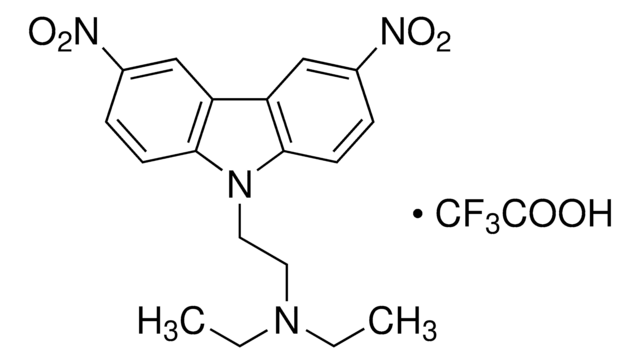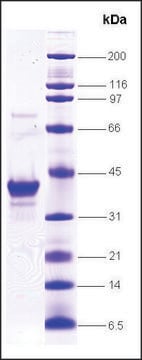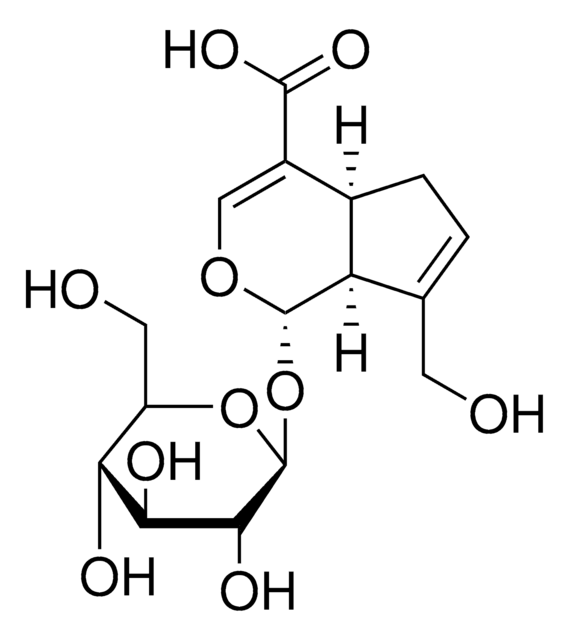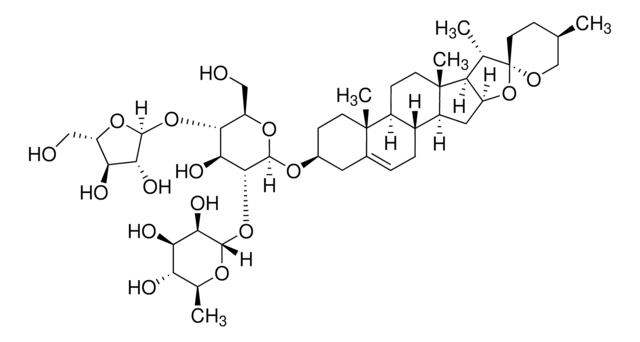SML2634
QX77
≥98% (HPLC)
Synonym(s):
N-(4-(7-Chloro-2H-benzo[b][1,4]oxazin-3-yl)phenyl)acetamide, N-[4-(7-Chloro-2H-1,4-benzoxazin-3-yl)phenyl]acetamide, QX 77, QX-77
Sign Into View Organizational & Contract Pricing
All Photos(1)
About This Item
Empirical Formula (Hill Notation):
C16H13ClN2O2
CAS Number:
Molecular Weight:
300.74
MDL number:
UNSPSC Code:
12352200
NACRES:
NA.77
Recommended Products
Assay
≥98% (HPLC)
form
powder
color
white to beige
solubility
DMSO: 2 mg/mL, clear
storage temp.
2-8°C
Biochem/physiol Actions
QX77 is a chaperone-mediated autophagy (CMA) activator derived from the atypical retinoid AR7 that activates CMA by antagonizing retinoic acid receptor-α (RARα) signaling. QX77 rescues defective trafficking & lysosomal localization of the CMA receptor LAMP2A in cystinotic Ctns-/- MEFs and CTNS-KO human proximal tubule cells (PTCs) by restoring Rab11 expression and Rab11-positive vesicles trafficking to the level seen in wild-type cells (20 μM, 48 hrs). CMA activation by QX77 treatment (20 μM, 5 days) also significantly reduces toxic α-synuclein (α-syn) accumulation in PD patients iPSCs-derived astrocytes with LRRK2 G2019S mutation.
Storage Class Code
13 - Non Combustible Solids
WGK
WGK 3
Flash Point(F)
Not applicable
Flash Point(C)
Not applicable
Certificates of Analysis (COA)
Search for Certificates of Analysis (COA) by entering the products Lot/Batch Number. Lot and Batch Numbers can be found on a product’s label following the words ‘Lot’ or ‘Batch’.
Already Own This Product?
Find documentation for the products that you have recently purchased in the Document Library.
Jaime Anguiano et al.
Nature chemical biology, 9(6), 374-382 (2013-04-16)
Chaperone-mediated autophagy (CMA) contributes to cellular quality control and the cellular response to stress through the selective degradation of cytosolic proteins in lysosomes. A decrease in CMA activity occurs in aging and in age-related disorders (for example, neurodegenerative diseases and
Angelique di Domenico et al.
Stem cell reports, 12(2), 213-229 (2019-01-15)
Parkinson's disease (PD) is associated with the degeneration of ventral midbrain dopaminergic neurons (vmDAns) and the accumulation of toxic α-synuclein. A non-cell-autonomous contribution, in particular of astrocytes, during PD pathogenesis has been suggested by observational studies, but remains to be
Jinzhong Zhang et al.
Frontiers in endocrinology, 10, 21-21 (2019-02-19)
Cystinosis is a lysosomal storage disorder caused by defects in CTNS, the gene that encodes the lysosomal cystine transporter cystinosin. Patients with nephropathic cystinosis are characterized by endocrine defects, defective proximal tubule cell (PTC) function, the development of Fanconi syndrome
Jinzhong Zhang et al.
The Journal of biological chemistry, 292(25), 10328-10346 (2017-05-04)
The lysosomal storage disease cystinosis, caused by cystinosin deficiency, is characterized by cell malfunction, tissue failure, and progressive renal injury despite cystine-depletion therapies. Cystinosis is associated with defects in chaperone-mediated autophagy (CMA), but the molecular mechanisms are incompletely understood. Here
Our team of scientists has experience in all areas of research including Life Science, Material Science, Chemical Synthesis, Chromatography, Analytical and many others.
Contact Technical Service








